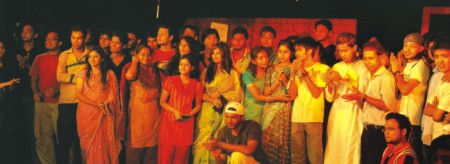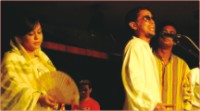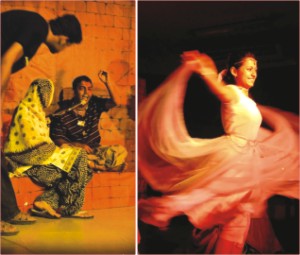Feature
Not So Kalponik after all
Tamoha Binte Siddiqui & Rifat Islam Esha
Photos by: Shadman Sakib

A hypocritical politician, a mischievous pickpocket, a corrupted traffic police, a philosophical fortune-teller, a wise lunatic and three talking dummies in front of a store these were the main characters or ingredients of the much lauded and appreciated play organized by the North South University Shangshkritik Shangathan (NSUSS), called “Golpotir Shobgulo Choritro Kalponik”. After a month long period of hard work and hype, the play was finally staged on the 9th of July in North South University. As true for most NSUSS in-house productions, this play was all that it was expected to be, and even much more.
North South University Shangshkritik Shangathan (NSUSS) is one of the pioneer clubs of North South University. For last thirteen years it has been one of the most successful clubs with all of its activities.
 As we always try to send a moral message through our programs, it was not different for the 'Summer Magazine' of this year. And the message we wanted to relate through this particular play was that of taking actions instead of saying hollow words. We all know how to bad mouth and criticize other people and their actions, but when we are put in the same situation, do we do something any different? Keeping this theme in mind, the show was developed and enacted. As we always try to send a moral message through our programs, it was not different for the 'Summer Magazine' of this year. And the message we wanted to relate through this particular play was that of taking actions instead of saying hollow words. We all know how to bad mouth and criticize other people and their actions, but when we are put in the same situation, do we do something any different? Keeping this theme in mind, the show was developed and enacted.
 This subtly constructed play was intended to deliver a substantial moral lesson, depicting characters that one may encounter while stuck in a traffic jam. It started in a street with almost every possible pedestrian characters: a dual-faceted fortuneteller (whose morals are suppressed by the worldly hypocrisy), a policeman (blinded by corruption), a cranky shopkeeper (with his three mannequins who played a major role; expressed their urge to become human yet were uncertain of being a part of this insane world), a maniac and an alcoholic (who could not survive the brutality of a power orientated world), a politician (who promised for a brighter future but distinctly projected deception; he called a hunger strike and had dinner 'behind the curtains'), a pickpocket, a businessman, a fraud Canvasser and three fairies (who ultimately turn the mannequins into humans but fail to bestow them the same conscience to be "good" which they formerly had before their transformation by the gift of the fairies). The show also consisted of several moralistic songs and the last dance by the fairies. The characters were played in the show by the members of NSUSS. The politician was Zico, police officer was Afnan, and the pickpocket was Ratul. This subtly constructed play was intended to deliver a substantial moral lesson, depicting characters that one may encounter while stuck in a traffic jam. It started in a street with almost every possible pedestrian characters: a dual-faceted fortuneteller (whose morals are suppressed by the worldly hypocrisy), a policeman (blinded by corruption), a cranky shopkeeper (with his three mannequins who played a major role; expressed their urge to become human yet were uncertain of being a part of this insane world), a maniac and an alcoholic (who could not survive the brutality of a power orientated world), a politician (who promised for a brighter future but distinctly projected deception; he called a hunger strike and had dinner 'behind the curtains'), a pickpocket, a businessman, a fraud Canvasser and three fairies (who ultimately turn the mannequins into humans but fail to bestow them the same conscience to be "good" which they formerly had before their transformation by the gift of the fairies). The show also consisted of several moralistic songs and the last dance by the fairies. The characters were played in the show by the members of NSUSS. The politician was Zico, police officer was Afnan, and the pickpocket was Ratul.
The Canvasser, astrologist, crazy man roles were played by Rana, Faisal ad Sakib respectively. The brilliantly choreographed dance was staged by Shompreeti, Akaa, Leena and the main three mannequins Antu, Mashfiq and Erfan. The melodious songs were sung by Rafi, Turjo, Oishi and Nusrat. The recitation was done by Alim. The other supporting actors were also really great, namely Raka, Riasat, Imran, Rabbi, Tamoha, Anika, Sarjana, Showkat, Oroni, Joseph, Shreezon and Auyon. Besides, on the musical support, Mubasswer and Shadman performed really well.
Although the play is sarcastically titled “Golpotir Shobgulo Choritro Kalponik”, I guess all of us will agree that we can all relate to at least one of the characters in the play. We see injustice and corruption everywhere; we talk about it and also criticize and blame others behind their backs for it. Shakespeare famously wrote “All the world's a stage, and all the men and women merely players”, but we say that all the world's a stage, and we are all merely the audience, observing everything going on around us and then moving on with our own lives.
But this is not the way to be. It is high time for us to, as Mahatma Gandhi said, “Be the change we want to see in the world.”
|
